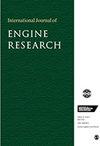A relative comparison of HCCI, PCCI, and RCCI combustion strategies: an alternative fuels perspective
IF 2.1
4区 工程技术
Q2 ENGINEERING, MECHANICAL
引用次数: 0
Abstract
Low temperature combustion (LTC) strategies have the potential for simultaneous reduction in oxides of nitrogen (NOx) and soot emissions while achieving higher thermal efficiency. Commercial widespread implementation of LTC strategies demands addressing several challenges, including narrow operating load range, lack of ignition timing control, and reducing high unburned hydrocarbon (HC) and carbon monoxide (CO) emissions. These challenges could be because the conventional engine design and fuels cannot adapt well to LTC modes. Thus, replacing conventional diesel fuel with suitable alternative fuels for LTC strategies is essential. In the present work, three LTC strategies, Homogenous Charge Compression Ignition (HCCI), Premixed Charge Compression Ignition (PCCI), and Reactivity Controlled Compression Ignition (RCCI), are compared with conventional diesel combustion in a production, light-duty diesel engine from an alternative fuel perspective to come up with a befitting strategy and fuel to achieve wider operating range and lower emissions. The fuel selection strategy based on the fundamental fuel property requirements of the three LTC strategies has been discussed in detail. The baseline reference data is fixed by comparing three LTC strategies with conventional diesel combustion using diesel and gasoline as reference fuel at 40% load, the maximum common achievable load among the three LTC strategies. This is followed by an investigation of the effect of alternative fuels across three LTC strategies to address the shortcomings of the LTC strategies. The results show that the engine operating load range could be extended, and HC and CO emissions are reduced significantly with alternative fuels in the three LTC strategies.HCCI、PCCI 和 RCCI 燃烧策略的相对比较:替代燃料视角
低温燃烧(LTC)策略有可能同时减少氮氧化物(NOx)和烟尘的排放,同时实现更高的热效率。低温燃烧策略在商业上的广泛实施需要解决几个难题,包括狭窄的工作负荷范围、缺乏点火正时控制,以及减少高浓度未燃烧碳氢化合物(HC)和一氧化碳(CO)排放。这些挑战可能是由于传统的发动机设计和燃料不能很好地适应 LTC 模式。因此,用合适的替代燃料取代传统柴油以实现 LTC 策略至关重要。在本研究中,从替代燃料的角度出发,比较了三种 LTC 策略,即均质充量压缩点火(HCCI)、预混合充量压缩点火(PCCI)和反应控制压缩点火(RCCI),并在生产型轻型柴油发动机中与传统柴油燃烧进行了比较,以提出合适的策略和燃料,从而实现更宽的工作范围和更低的排放。我们详细讨论了基于三种 LTC 策略的基本燃料特性要求的燃料选择策略。通过比较三种 LTC 策略和传统的柴油燃烧(使用柴油和汽油作为参考燃料,负载为 40%,这是三种 LTC 策略中可实现的最大共同负载),确定了基准参考数据。随后,研究了替代燃料对三种 LTC 策略的影响,以解决 LTC 策略的不足之处。结果表明,在三种 LTC 策略中,使用替代燃料可以扩大发动机的工作负荷范围,并显著减少 HC 和 CO 排放。
本文章由计算机程序翻译,如有差异,请以英文原文为准。
求助全文
约1分钟内获得全文
求助全文
来源期刊

International Journal of Engine Research
工程技术-工程:机械
CiteScore
6.50
自引率
16.00%
发文量
130
审稿时长
>12 weeks
期刊介绍:
The International Journal of Engine Research publishes high quality papers on experimental and analytical studies of engine technology.
 求助内容:
求助内容: 应助结果提醒方式:
应助结果提醒方式:


